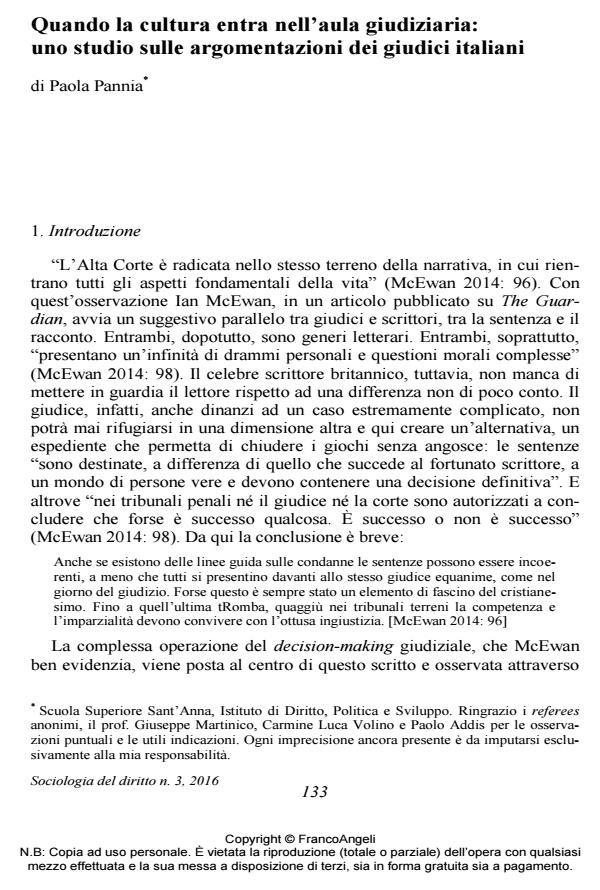The management of cultural diversity in the courtroom: A socio-legal study on the judicial discourse of Italian judges
Journal title SOCIOLOGIA DEL DIRITTO
Author/s Paola Pannia
Publishing Year 2017 Issue 2016/3
Language Italian Pages 30 P. 133-162 File size 330 KB
DOI 10.3280/SD2016-003007
DOI is like a bar code for intellectual property: to have more infomation
click here
Below, you can see the article first page
If you want to buy this article in PDF format, you can do it, following the instructions to buy download credits

FrancoAngeli is member of Publishers International Linking Association, Inc (PILA), a not-for-profit association which run the CrossRef service enabling links to and from online scholarly content.
Recently, the issue of the so-called "culturally motivated crimes" (also "cultural crimes") has been at the centre of a vivid scholarly debate. Until now, however, scholars have mainly inquired whether the constitutional framework allows the "cultural exception", and, if so, what are the limits and instruments for this recognition. However, how do judges concretely respond to this issue? Which are the strategies actually used by judges to adjudicate cultural claims inside courtrooms? This paper attempts to address these questions, drawing upon the evidences of an empirical study conducted on a sample of 68 cases of cultural crimes in Italy. Results reveal that judges’ response (and not only that) is sometimes vague and inaccurate, showing the loopholes of the legal education about the management of cultural diversity.
Keywords: Multiculturalism - Judicial reasoning - Culturally motivated crimes - Legal education
- Basile, Fabio, 2010. Immigrazione e reati culturalmente motivati. Milano: Giuffrè.
- Bateson, Gregory, [1991]1997. A Sacred Unity: Further Steps to an Ecology of Mind. Tr. it. Una sacra unità. Altri passi verso un’ecologia della mente. Milano: Adelphi.
- Benhabib, Seyla, [2002]2005. The Claims of Culture: Equality and Diversity in the Global Era. Tr. it. La rivendicazione dell’identità culturale. Eguaglianza e diversità nell’era globale. Bologna: il Mulino.
- Bernardi, Alessandro, 2010. Il fattore culturale nel diritto penale. Torino: Giappichelli.
- Catelani, Elisabetta, & Elettra Stradella, 2014. Equal Opportunities and Legal Education: A Mainstream Perspective. European Journal of Legal Studies, 7, 2: 180-213.
- Chiu, Elaine Marie, 2006. Culture as Justification Not Excuse. American Criminal Law Review, 43, 4: 1317-1374.
- De Maglie, Cristina, 2010. I reati culturalmente motivati. Pisa: Edizioni ETS.
- Dolcini, Emilio, 1985. Potere discrezionale (dir. proc. pen.). In Enciclopedia del diritto, XXXIV: 744-769.
- Dundes Renteln, Alison, 2004. The Cultural Defense. Oxford: Oxford University Press.
- Ferlito, Salvatore, 2012. Le religioni, il giurista e l’antropologo. Soveria Mannelli: Rubettino.
- Fiandaca, Giovanni, 2014. Sul bene giuridico. Un consuntivo critico. Torino: Giappichelli.
- Foblets, Marie Claire, & Alison Dundes Renteln, 2009. Multicultural Jurisprudence. Comparative Perspectives on the Cultural Defense. Oxford: Bloomsbury.
- Geertz, Clifford, [1973]1998. The Interpretation of Culture: Selected Essays. Tr. it. Interpretazione di culture. Bologna: il Mulino.
- Lanza, Luigi, 2009. La motivazione della sentenza penale: decidere, scrivere, argomentare. Incontro di studio sul tema: “La motivazione della sentenza penale”. Roma, 14-16 settembre.
- Massa, Teresa, 1993. L’attività cognitiva del giudice e il pregiudizio di genere. Questione giustizia, 3: 659-666. DOI: 10.3280/QG2013-005001
- McEwan, Ian, 2014. The Law versus Religious Belief. Tr. it. Legge e religione. Internazionale, 26 settembre: 96-101.
- Pannia, Paola, 2014. Grammatica di un’esclusione: i Rom sotto processo. Studi sulla questione criminale, 9, 1-2: 121-136. DOI: 10.7383/80027
- 2015, Cultura e processo. Quale rilievo per i “reati culturali” nel processo penale? Tesi di dottorato.
- Parisi, Francesco, 2010. Cultura dell’“altro” e diritto penale. Torino: Giappichelli.
- Pascuzzi, Giovanni, 2013. Giuristi si diventa. Bologna: il Mulino.
- Phillips, Anne, 2007. Multiculturalism without Culture. Princeton: Princeton University Press.
- Rao, Balagangadhara, 2012. Reconceptualizing India Studies. New Delhi: Oxford University Press.
- Ricca, Mario, 2014. Delitti d’ignoranza. Migrazioni, traduzione interculturale e categorizzazione dell’azione criminosa. Rassegna italiana di criminologia, 2: 128-139.
- Rivera, Anna Maria, 2001. Cultura. In René Gallissot, Mondher Kilani, & Anna Maria Rivera (a cura di), L’imbroglio etnico. Bari: Edizioni Dedalo.
- Ruggiu, Ilenia, 2012. Il giudice antropologo. Milano: FrancoAngeli.
- Sagiv, Masua, 2015. Cultural Bias in Judicial Decision Making. Boston College Journal of Law & Social Justice, 35: 229-258.
- Taruffo, Michele, 1975. La motivazione nella sentenza civile. Padova: Cedam.
- Van Broeck, Jeroen, 2001. Cultural Defence and Culturally Motivated Crimes. European Journal of Crime. Criminal Law and Criminal Justice, 9, 1: 1-31.
- Volpp, Leti, 1996. Talking “Culture”: Gender, Race, Nation and the Politics of Multiculturalism. Columbia Law Review, 96: 1573-1617.
- Diversity and Inclusion in Italy Claudia Cavallari, pp.571 (ISBN:978-3-031-81937-7)
- Dalla Cultural Defense al "test culturale": luci e (soprattutto) ombre del dibattito italiano Laura Scudieri, in SOCIOLOGIA DEL DIRITTO 1/2018 pp.125
DOI: 10.3280/SD2018-001006
Paola Pannia, Quando la cultura entra nell’aula giudiziaria: uno studio sulle argomentazioni dei giudici italiani in "SOCIOLOGIA DEL DIRITTO " 3/2016, pp 133-162, DOI: 10.3280/SD2016-003007